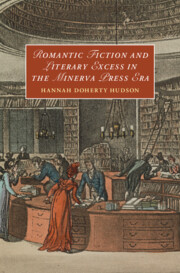Book contents
- Romantic Fiction and Literary Excess in the Minerva Press Era
- Cambridge Studies in Romanticism
- Romantic Fiction and Literary Excess in the Minerva Press Era
- Copyright page
- Dedication
- Contents
- Figures
- Acknowledgements
- Note on the Text
- Abbreviations
- Introduction
- Chapter 1 Minerva’s Writers and Reviewers
- Chapter 2 Godwin, Bage, Parsons, and Novels as They Are
- Chapter 3 Imitating Ann Radcliffe
- Chapter 4 Hannah More’s Cœlebs and the Novel of the Moment
- Chapter 5 Fiction as Fashion from Belinda to Miss Byron
- Chapter 6 Walter Scott’s Industrial Antiques
- Epilogue
- Notes
- Bibliography
- Index
- Cambridge Studies in Romanticism
Chapter 1 - Minerva’s Writers and Reviewers
Published online by Cambridge University Press: 04 May 2023
- Romantic Fiction and Literary Excess in the Minerva Press Era
- Cambridge Studies in Romanticism
- Romantic Fiction and Literary Excess in the Minerva Press Era
- Copyright page
- Dedication
- Contents
- Figures
- Acknowledgements
- Note on the Text
- Abbreviations
- Introduction
- Chapter 1 Minerva’s Writers and Reviewers
- Chapter 2 Godwin, Bage, Parsons, and Novels as They Are
- Chapter 3 Imitating Ann Radcliffe
- Chapter 4 Hannah More’s Cœlebs and the Novel of the Moment
- Chapter 5 Fiction as Fashion from Belinda to Miss Byron
- Chapter 6 Walter Scott’s Industrial Antiques
- Epilogue
- Notes
- Bibliography
- Index
- Cambridge Studies in Romanticism
Summary
This chapter tracks descriptions of and responses to literary excess through the two groups of people most implicated in the Romantic period’s perceptions of it: reviewers and authors themselves. Beginning with the bibliographical commonplace that the end of the eighteenth century was the moment at which the number of novels published first began to exceed the annual reviewing capability of the traditional reviews, it follows the fate of the Minerva Press’s novels in the pages of major and minor periodicals, demonstrating how a rhetoric of excess in these reviews not only established popular discourses about which novels were worthwhile, but actively marginalized certain categories of fiction. Authors, naturally, responded to these attacks, and the chapter traces their use of prefaces to defend their work and position their own novels within a crowded marketplace.
- Type
- Chapter
- Information
- Publisher: Cambridge University PressPrint publication year: 2023

